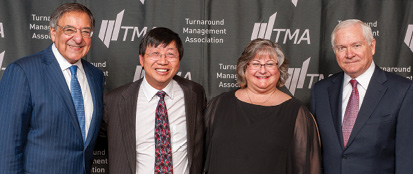
FROM OUR MANAGING PARTNER
Winter 2016 Newsletter
FROM OUR MANAGING PARTNER
Winter 2016 Newsletter
We’re pleased to bring you another issue of the Golan & Christie Newsletter. Because your success is our focus, our newsletter highlights recent information that we feel may impact many of our clients.
Articles in this edition include:
NEW HOPE FOR THE ILLINOIS ENTREPRENEUR

Rita Garry and Nichole Fundora explain how Illinois’ new House Bill 3429 may provide new opportunities for Illinois start-up companies and investors through crowdfunding
EMPLOYMENT ALERTS

We discuss important new reporting requirements mandated to Applicable Large Employers in 2016 as a result of the Affordable Care Act. You’ll also learn the need to review your current employment agreements – as a result of a recent ruling, certain post-employment restrictions might be unenforceable if they are drafted too broadly
As we enter a new year, Golan & Christie will continue our commitment to providing superior service and focusing on your needs. Whether you are an entrepreneurial business, family business, high net worth individual or non-profit organization, our goal is to earn your trust every day so we can continue to work with you for the long term.
If there is anything we can do for you, please do not hesitate to contact us. Thank you.
Stephen L. Golan
CROWDFUNDING UPDATE
New Hope For The Illinois Entrepreneur
CROWDFUNDING UPDATE
New Hope For The Illinois Entrepreneur
BY RITA W. GARRY & NICHOLE M. FUNDORA
2016 brings ample opportunity and inspiration for hopeful entrepreneurs and young startups in Illinois. Illinois recently enacted House Bill 3429 (“HB 3429”) which amends the Illinois Securities Law of 1953 (the “Act”) to allow Illinois companies and entrepreneurs to raise capital from Illinois residents, subject to monetary limitations, through equity crowdfunding.

What is Equity Crowdfunding?
Equity crowdfunding is an online financing mechanism, which enables multiple parties to make small contributions to a small company or startup in exchange for ownership interest in such company. Since equity crowdfunding typically involves the sale of securities, federal and state security registration requirements are triggered.
Registration is a complex and expensive process. Since the purpose of crowdfunding is to facilitate multiple small offerings and sales, registration is often impractical for a startup company. However, both state and federal law provide certain exemptions which allow a business to circumvent registration (companies must still comply with other requirements of securities law, such as antifraud provisions). Although federal law provides for an intrastate offering exemption, intrastate sales of securities are still subject to state law. Prior to HB 3429, Illinois’ registration exemptions did not extend to equity crowdfunding, even for entirely intrastate transactions.
Illinois House Bill 3429
Most notably, HB 3429 modified the Act with the addition of two new sections: Exemption 4T and Section 8d.
Exemption 4T
Exemption 4T permits a company in good standing under Illinois law (an “Issuer”) to offer and sell securities to Illinois resident investors, without registering such securities, if:
- The offer/sale complies with the federal exemption for intrastate offering
- The Issuer does not raise more than $1,000,000 through intrastate crowdfunding in a twelve (12) month period. This monetary limit is expanded to $4,000,000 if the Issuer provides audited financial statements to prospective purchasers.
- The Issuer does not sell to a particular Illinois resident investor an aggregate amount exceeding $5,000 within a twelve (12) month period.
- Importantly, HB 3429 adopts the definition of “Accredited Investor” as defined by federal law and amends Exemption 4H to comply with such definition. As such, money contributed by an Accredited Investor does not count towards the monetary limitations of Exemption 4T.
- Beyond monetary limitations, Exemption 4T requires an Issuer to make certain financial disclosures, provide detailed offering materials for prospective purchasers, and designate a Qualified Escrowee, who receives and holds payments in connection with an offer or sale, pursuant to an escrow agreement. A “Qualified Escrowee” is either a title company or a bank, regulated trust company, savings bank, savings and loan association, or credit union which is authorized and has a physical business located in Illinois.

Section 8d
Section 8d requires an Issuer seeking to make an offering or sale pursuant to Exemption 4T to make such offer through the use of one or more Registered Internet Portals. To be a “Registered Internet Portal,” the internet portal or the owning entity must be one of following:
- Registered broker dealer as required under federal law (15 U.S.C. 78o);
- Funding portal required under federal law (15 U.S.C. 77d-1);
- Dealer registered under the Act; or
- An exempt internet portal that files an application for registration as a Registered Internet Portal and pays the filing fee ($300). An internet portal qualifies for exempt internet portal status if all of the following conditions are met:
- It does not solicit purchases, sales, or offer to buy securities offered on its internet portal
- It does not hold or collect funds in connection with the offerings/sales
- It does not compensate its employees based on the sales
- It is not compensated based on amount of securities sold
The fee it charges to issuers is a fixed amount for each offering - It does not offer investment advice (subject to a few exceptions /assumptions)
Conclusion
HB 3429 became effective on January 1, 2016, with supplementary regulations being finalized shortly thereafter. In addition, on October 30, 2015, the SEC adopted final rules that permit crowdfunding from non-accredited investors, subject to the monetary limitations, which are scheduled to become effective January 29, 2016. HB 3429 stands to deliver opportunities for Illinois startups and Illinois resident investors alike, while also keeping successful businesses and people in Illinois.
Contact Rita Garry, (312)696.1366, rwgarry@golanchristie.com or Nichole Fundora (312)696.1367, nmfundora@golanchristie.com to discuss how crowdfunding relates to your business.
Turnaround Management Association Chicago/Midwest Chapter

On November 23, 2015, Golan & Christie partner, Barb Yong, chaired the Executive Speakers Forum of the Turnaround Management Association Chicago/Midwest Chapter. She is pictured here with her husband, Jim Yong and with speakers, Robert Gates (far right) and Leon Panetta (far left), the 22nd and 23rd Secretaries of Defense, who addressed a sell-out crowd of over 650 business leaders and turnaround professionals.

ACA Reporting Requirements For Large Employers Begin In 2016
ACA Reporting Requirements For Large Employers Begin In 2016
As the calendar turns the page to 2016, the Affordable Care Act’s (“ACA”) new reporting requirements officially launch. One of those new reporting requirements mandates that all Applicable Large Employers (“ALE”) must report information regarding their employees’ health care coverage by submitting specific forms to the IRS. Furthermore, ALEs must report this information to all full-time employees.
To determine whether your company qualifies as an ALE for a specific calendar year, look at the average size of your workforce during the prior year. If your company had an average workforce of at least 50 full-time employees, including full-time equivalent employees, then your company qualifies as an ALE.
All companies that qualify as an ALE for the 2015 calendar year must report health care coverage information to the IRS using 2 separate forms: 1095-C and 1094-C, both of which are available at (www.irs.gov/Forms-&-Pubs). These forms must be filed with the IRS no later than May 31, 2016, or June 30, 2016 if filed electronically.
In addition to reporting health care coverage information to the IRS, ALEs must also report coverage information to their employees. To do this, employers simply provide a statement to employees that includes the same information that the employer provided to the IRS. These statements must be given to employees by February 1, 2016.
Finally, for smaller employers who do not qualify as ALEs, there may still be filing requirements. If a non-ALE is a member of a controlled or affiliated service group that collectively has at least 50 Full-time Employees (including full-time equivalent employees), they are required to file Forms 1095-C and 1094-C with the IRS and provide that information to their employees. Companies could be in a controlled or affiliated service group if they have common owners, provide services for each other, or work together to provide services for other third parties. Further, smaller employers with self-funded health plans are also subject to IRS filing requirements.
Time To Review Your Employment Agreements!
Time To Review Your Employment Agreements!
Courts are now scrutinizing all post-employment restrictions with a fine tooth comb. In the past, non-competition clauses received the most scrutiny. Now, confidentiality provisions and non-solicitations of employees and customers may be unenforceable if they are drafted too broadly.
A recent decision from an Illinois appellate court in Assured Partners, Inc. v. Schmitt, made clear that broad stroke or generalized confidentiality and non-solicitation-of-employee provisions–which were previously given greater leniency— are unenforceable in Illinois and struck the provisions in their entirety. The agreement at issue in the case, which was between the employer and a high-level sales person, was especially criticized for seeking to restrict the former employee’s interactions with potential customers and vendors, because the Court believed such restrictions would make it impossible for the employee to find replacement employment. The Court even refused to modify the clauses to comply with the law because the clauses were too general and overbroad.
Restrictive covenants continue to be a changing area of the law. If your own agreements have not been updated recently, they are likely obsolete.
If you have questions or need additional information, please contact an employment attorney at Golan & Christie.

Intellectual Property Suits That Will Not Be Heard By The U.S. Supreme Court
Intellectual Property Suits That Will Not Be Heard By The U.S. Supreme Court
The last few years have seen a seen a lot of Intellectual Property activity in the Supreme Court. But not all cases make the cut. This term, the U.S. Supreme Court has declined to hear some significant Intellectual Property cases.
-
Gerald Morawski v. Lightstorm Entertainment Inc. et al. The plaintiff, a visual effects designer, alleged that James Cameron stole the idea for “Avatar” from him. The trial court granted summary judgment on the basis that Cameron was able to show independent creation. The Ninth Circuit Court of Appeals affirmed. Independent creation happens in many copyright cases. Authors of creative works should consider documenting the evolution of their works such as dating and keeping prior versions of the works as they evolve.
-
A.V.E.L.A. Inc. et al v. Fifty-Six Hope Road Music Ltd. et al. In this case, merchandisers had produced products using the late Bob Marley’s images on their products. Marley’s children sued for using unlicensed images. The defendants argued that when Marley’s children gave an exclusive license to one company, they created a monopoly that wasn’t authorized by Copyright Law and Trademark Law. The jury’s verdict in favor of the Marley heirs will now stand. The defendants in this case unsuccessfully fought a well-accepted public policy reason for protecting the authors and owners of Intellectual Property
-
Home Legend LLC v. Mannington Mills, Inc. This case involved the standard of copyright creativity. At issue was whether a design that replicates natural wood grain lacked sufficient originality for copyright protection. The 11th Circuit Court’s opinion that the design was sufficiently original will remain intact. As this case demonstrates, the creativity standard for copyrights is rather low.
-
Halo Electronics Inc. v. Pulse Electronics Inc. et al. Halo sued Pulse for patent infringement involving electronic components. When Halo sought attorney’s fees due to willful infringement, the district court applied a two prong test to determine whether the infringement was willful. The twoprong test has both an objective and a subject analysis. This same type of analysis had been struck down by the U.S. Supreme Court in Octane Fitness, LLC v. ICON Health & Fitness involving a different provision of the patent statute. The Federal Circuit affirmed the district court judgment that Halo failed to prove the objective prong. Despite the U.S. Supreme Court’s decision in Octane, the two prong test for determining willful infringement may still be applied under certain circumstances.
-
Editions Limited West v. Victoria Ryan. Ryan did not register her copyright before her former licensee, Editions, committed copyright infringement. As a result, Ryan could not recover attorney’s fees based on the fee shifting section of the Copyright Act. However, Ryan was able to recover attorney’s fees based upon a fee shifting provision in the agreement she had with Editions. The Ninth Circuit determined that the Copyright Act would not preempt recovery of attorney’s fees based on a contract. This decision demonstrates the power of a well-crafted license agreement.
To discuss how these issues apply to your company contact: Beverly A. Berneman (312)696-1221, baberneman@golanchristie.com
Visit the IP blog at: www.golanchristie.com/blog
